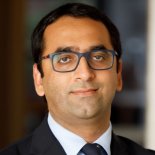Diagnosing and Treating Pancreatic Cancer


Pancreatic cancer can be a difficult cancer to diagnose and treat because symptoms don’t often appear until the disease is very advanced. New imaging techniques, personalized therapies and genetic knowledge are helping to change the landscape, as well as enabling families and loved ones to access better screening tools and technologies. Ongoing pancreatic cancer research is leading to continued advancements in the management and outcomes for patients and their families.
Guests: Despina Siolas, MD, PhD, a medical oncologist and pancreatic cancer researcher at Weill Cornell Medicine and NewYork-Presbyterian Hospital
Host: John Leonard, MD, a leading hematologist and medical oncologist at Weill Cornell Medicine and NewYork-Presbyterian Hospital









